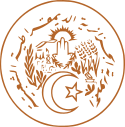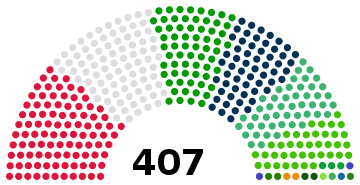2021 Algerian parliamentary election
| |||||||||||||||||||||||||||||||||||||||||||||||||||||||||||||||||||||||||||||||||||||
All 407 seats in the People's National Assembly 204 seats needed for a majority | |||||||||||||||||||||||||||||||||||||||||||||||||||||||||||||||||||||||||||||||||||||
| Turnout | 22.99% ( | ||||||||||||||||||||||||||||||||||||||||||||||||||||||||||||||||||||||||||||||||||||
|---|---|---|---|---|---|---|---|---|---|---|---|---|---|---|---|---|---|---|---|---|---|---|---|---|---|---|---|---|---|---|---|---|---|---|---|---|---|---|---|---|---|---|---|---|---|---|---|---|---|---|---|---|---|---|---|---|---|---|---|---|---|---|---|---|---|---|---|---|---|---|---|---|---|---|---|---|---|---|---|---|---|---|---|---|---|
This lists parties that won seats. See the complete results below.
| |||||||||||||||||||||||||||||||||||||||||||||||||||||||||||||||||||||||||||||||||||||
 |
|---|
|
|
|
|
Snap parliamentary elections were held in Algeria on 12 June 2021 to elect all 407 members of the People's National Assembly.[1] Initially expected to be held 2022, the elections were brought forward following a constitutional amendment approved in a referendum in November 2020.
Background
[edit]2017 legislative election
[edit]The 2017 parliamentary elections were characterized by a low turnout of 35%, lower than the 43% turnout in the 2012 parliamentary elections. The ruling coalition, an alliance between the National Liberation Front (FLN) and the National Rally for Democracy (RND), retained the absolute majority of seats in the National People's Assembly, despite a sharp decline in seats won by FLN.[2]
Society in Algeria has been tense for several years due to the fall in oil prices, as income from hydrocarbons represented 60% of the state budget. A large part of the population encountered economic difficulties because the prices of basic necessities were heavily subsidized by the state.[3]
2019–20 Algerian protests
[edit]President Abdelmadjid Tebboune, controversially elected in December 2019 following the protests known as "Hirak" ('The Movement'), initiated a constitutional reform at the start of his term which led to the holding of a referendum on November 1, 2020. President Tebboune declared that an early dissolution of the two chambers of parliament would take place in late 2020 if the new constitution was approved by voters.[4][5] While the referendum was approved, the call for new election was delayed by Tebboune staying in Germany for over two months to get treatment for COVID-19.[6]
Electoral system
[edit]Algeria has a bicameral parliament of which the People's National Assembly is the lower house. This is made up of 407 seats filled by proportional representation in 59 constituencies corresponding to the 58 Provinces (prefectures) of the country plus one constituency representing the diaspora.[7] Each constituency is allocated a number of seats according to its population: one seat per segment of 120,000 inhabitants, plus one seat for any remaining segment of 60,000 inhabitants, with a minimum of three seats per constituency.[7] The lists are open, with preferential voting, without mixing, and an electoral threshold of 5% of the votes cast,[8] after counting of the votes, the distribution of seats is done according to the method known as "the strongest remainder".[9][10]
These are the first elections since the modification of the electoral law a few months earlier, which introduced open lists and the electoral threshold. Exceptionally for this ballot, the new law lifts the conditions restricting the participation of parties to only those having obtained at least 4% of the votes cast in the previous elections, or gathered the sponsorship signatures of 250 citizens in each of the constituencies. in which one of their candidates presents himself.[8] The total number of seats is also reduced for this election, dropping from 462 to 407 seats following a presidential decree modifying the distribution key according to the population. The previous elections were in fact organized with one seat per 80,000 inhabitants, plus one seat for any remaining 40,000 inhabitants, for a minimum of four seats per constituency.[10]
A total of 24,490,180 voters are registered to vote, including 23,587,815 in Algeria and 902,365 abroad.[11] The total amount was later reduced to 24,453,992 voters after appeals to the Constitutional Court.[12]
Results
[edit]The election saw the lowest turnout of those held for the legislature in Algerian history (only the 2020 Algerian constitutional referendum saw a lower turnout overall), with under 23% of the eligible population participating. The governing National Liberation Front won a plurality of seats, although both it and coalition partner Democratic National Rally saw heavy losses. The nationalist Future Front, the Islamist Movement of Society for Peace, the new National Construction Movement and independents all saw large gains at their expense, while other entities saw minor changes. A total of 136 seats were won by candidates under the age of 40, 35 were won by women, and 274 were won by those with a tertiary education.
Following the elections, a coalition was formed by the National Liberation Front, Democratic National Rally, Future Front, and National Construction Movement, as well as several members from independent lists.
 | |||||
|---|---|---|---|---|---|
| Party | Votes | % | Seats | +/– | |
| National Liberation Front | 287,828 | 6.24 | 98 | –63 | |
| Movement of Society for Peace | 208,471 | 4.52 | 65 | +31 | |
| Democratic National Rally | 198,758 | 4.31 | 58 | –42 | |
| Future Front | 153,987 | 3.34 | 48 | +34 | |
| National Construction Movement | 106,203 | 2.30 | 39 | New | |
| Voice of the People | 13,103 | 0.28 | 3 | +2 | |
| Freedom and Justice Party | 10,618 | 0.23 | 2 | 0 | |
| New Algeria Front | 7,916 | 0.17 | 1 | 0 | |
| Justice and Development Front | 7,667 | 0.17 | 2 | – | |
| New Dawn | 7,433 | 0.16 | 2 | New | |
| Dignity Party | 5,942 | 0.13 | 1 | –2 | |
| Good Governance Front | 3,724 | 0.08 | 2 | New | |
| Jil Jadid | 3,576 | 0.08 | 1 | New | |
| Algerian National Front | 1,207 | 0.03 | 1 | +1 | |
| Minor independent lists that won seats | 256,732 | 5.57 | 84 | +56 | |
| Others | 3,337,487 | 72.39 | 0 | – | |
| Total | 4,610,652 | 100.00 | 407 | –55 | |
| Valid votes | 4,610,652 | 82.01 | |||
| Invalid/blank votes | 1,011,749 | 17.99 | |||
| Total votes | 5,622,401 | 100.00 | |||
| Registered voters/turnout | 24,453,992 | 22.99 | |||
| Source: Official Algerian Journal[13] | |||||
References
[edit]- ^ "Algerian president sets June 12 for early legislative elections". Al Jazeera. 11 March 2021. Retrieved 11 March 2021.
- ^ Macé, Célian. "Législatives algériennes: une défaite générale". Libération (in French). Retrieved 2021-02-14.
- ^ "Elections législatives en Algérie : vers une abstention historique ?". Marianne (in French). 2017-05-04. Retrieved 2017-05-04.
- ^ S, Mourad (21 September 2020). "Algérie: Abdelmajid Tebboune annonce des élections législatives anticipées". Tunisie Numérique (in French). Retrieved 2021-02-14.
- ^ "Algeria announces early legislative election". Reuters. Retrieved 2021-02-14.
- ^ "Algerian President Tebboune returns after Covid treatment in Germany". BBC News. 2020-12-29. Retrieved 2024-03-21.
- ^ a b Mostafa Ibnerradi. "الرئيس الجزائري يصدر قانون الدوائر الانتخابية ويقلص مقاعد البرلمان". www.alaraby.co.uk/ (in Arabic). Retrieved 2021-06-10.
- ^ a b "Official journal of the Algerian Republic" (PDF). Official Journal of the Algerian Republic. 10 March 2021. Archived from the original (PDF) on 11 June 2021. Retrieved 11 June 2021.
- ^ "IPU PARLINE database: ALGERIE (Al-Majlis Al-Chaabi Al-Watani), Système électoral". archive.ipu.org. Retrieved 2021-06-10.
- ^ a b "Législatives anticipées en Algérie : Le nombre de députés réduit à 407" (in French). Retrieved 2021-06-10.
- ^ "Législatives : le corps électoral définitif s'élève à 23.587.815 électeurs". aps.com. 6 April 2021. Archived from the original on 2021-04-06.
- ^ Laib, Cherif (2021-06-23). "Législatives: le conseil constitutionnel rend les résultats définitifs". Algerie360 (in French). Archived from the original on 2021-06-23. Retrieved 2021-07-01.
- ^ "Journal Officiel de la Republique Algerienne № 51" (PDF) (in French). Secretariat General du Gouvernement. 29 June 2021. Retrieved 31 August 2021.
